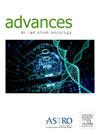Second Look Opportunity for Radiation Oncology Medical Residency During Virtual Interview Season
IF 2.2
Q3 ONCOLOGY
引用次数: 0
Abstract
Purpose
Despite easing of COVID-19 travel restrictions and social distancing, medical radiation oncology (RO) residency interviews for the 2023 Match remained exclusively virtual. Virtual interviews can be limited in providing program atmosphere, resident camaraderie, and city culture. Our institution offered a voluntary in-person (IP) second look (SL) to address these concerns and supplement the virtual interview.
Methods and Materials
A voluntary IP SL was offered on 3 dates to all applicants who successfully interviewed with the RO department for the 2023 Match (n = 54). Attendees of the SLs (n = 38) were invited to complete a voluntary 10-question anonymous survey after Match Day regarding their perspectives on this opportunity, including motivations for attending, financial burdens, and perceived benefits of SLs.
Results
Thirty-eight individuals (70%) attended 1 of the departmental SLs with 19 participants (50%) completing the survey. Sixteen out of 19 (84%) participants traveled >200 miles to attend. All surveyed applicants expressed gratitude for the IP SL opportunity and agreed that such opportunities should continue to be offered with exclusively virtual residency interviews. All participants reported that their decision to attend the SL was influenced by departmental financial support. Two applicants felt pressured to attend the SL to remain competitive for the program. The majority of applicants agreed that they achieved a better understanding of the program culture and the larger institution, resident camaraderie, and the surrounding city from this IP SL encounter compared to the virtual interview alone (18, 94%).
Conclusions
These IP SL opportunities were well-attended, well-received, and offered insights and experiences to RO resident applicants in the setting of exclusively virtual interviews. The cost of attendance may be a limiting factor when applicants are deciding to attend IP SLs. Caution is needed to ensure that applicants do not feel obligated to attend and SLs are not used as a platform for inappropriate post-interview communication.
求助全文
约1分钟内获得全文
求助全文
来源期刊

Advances in Radiation Oncology
Medicine-Radiology, Nuclear Medicine and Imaging
CiteScore
4.60
自引率
4.30%
发文量
208
审稿时长
98 days
期刊介绍:
The purpose of Advances is to provide information for clinicians who use radiation therapy by publishing: Clinical trial reports and reanalyses. Basic science original reports. Manuscripts examining health services research, comparative and cost effectiveness research, and systematic reviews. Case reports documenting unusual problems and solutions. High quality multi and single institutional series, as well as other novel retrospective hypothesis generating series. Timely critical reviews on important topics in radiation oncology, such as side effects. Articles reporting the natural history of disease and patterns of failure, particularly as they relate to treatment volume delineation. Articles on safety and quality in radiation therapy. Essays on clinical experience. Articles on practice transformation in radiation oncology, in particular: Aspects of health policy that may impact the future practice of radiation oncology. How information technology, such as data analytics and systems innovations, will change radiation oncology practice. Articles on imaging as they relate to radiation therapy treatment.
 求助内容:
求助内容: 应助结果提醒方式:
应助结果提醒方式:


